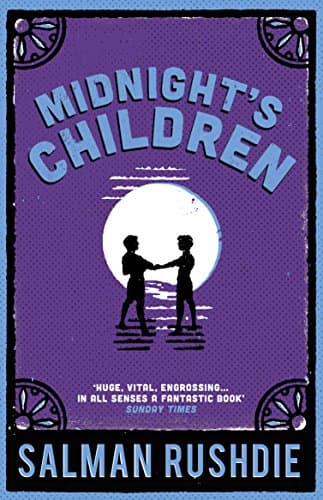
Salman Rushdie, Midnight's Children
Value For Money
Salman Rushdie, Midnight's Children
When you purchase through links on our site, we may earn an affiliate commission. Here's how it works.

User Reviews
Value For Money
Book: 'midnight's Children'author: Salman Rus
Book: 'Midnight's Children'Author: Salman Rushdie
"A moment comes, which comes but rarely in history"
- Thus, Jawahar Lal Nehru, 1947, 15th August, stroke of midnight.
Salman Rushdie created a similar rare moment in the literary history of Indian writing in English in 1981 with his grand opus which stormed the literary world and reshaped boundaries for Indian English Literature. The book 'Midnight's Children' establishes a unique South-Asian expression, recently freed from the fetters of a two-century long British colonial rule. With its giant and engrossinlgy rambling narrative, the book gives a voice to a patent post-colonial confusion about personal and national identity in developing third-world countries like India and Pakistan. What Amitav Ghosh attempted complicatedly in the dream structured story of 'The Shadow Lines' later is already evident in an embryonic form in Rushdie's 'Midnight's Children'. It has become a seminal book of the English speaking world of the twentieth century.
The book straddles epic proportions with the life of its protagonist, Saleem Sinai, one of the one thousand and one 'Midnight's Children', and whose life, in a densely allegorical sense, becomes a reflection of the tumultous progress of the new-born nation, with whom he shares the moment of his birth: the consummate midnight. Rushdie bollywoodises the book in having Saleem switched at birth by the nurse-maid Mary; landing him into a rich Muslim household, while his midnight brother, Shiva, seeps into the poor streets and slums. The narrative travels energetically and insightfully from Kashmir to Agra, from Bombay to Rawalpindi, from Karanchi to the Sundarbans and includes within its all-comsuming expanse, the essence of being a late-twentieth-century Indian. In a sense, 'Midnight's Children' becomes a form of metafiction prose which consciously gazes at itself and its new-found, mind-throbbing existence in a rapidly changing world.
The book is soaked in a style which links up political reality with magical thinking, deeply reminiscent of the works of Gunter Grass and Gabriel Garcia Marquez. But Rushdie infuses the genre of 'Magic Realism' with what he himself calls 'mad prose pyrotechnics'. The language is cluttered with Bombay slang; it is rich with puns, wordplays, colloquialisms, schizophrenic paragraphs and spawns a singular style in 'Hinglish', which inspired much of the Indians writing in English in the post-'Midnight's Children' world. Rushdie's prose pulsates with tadpole-like life and is frenetically unpredictable which keeps the reader trembling with excitement and perpetual surprises. Like staple Bollywood talkies, and only more brilliantly, the author injects touching emotionalisms, cutting satire, incisive humour and epiphanic snippets from the extraordinary behaviour of ordinary people. With actual extraordinary people, Rushdie is devastatingly sharp: Morarji Desai is the man who drinks his own urine, Sanjay Gandhi is out on a mission to snap the testicle-tubes and Indira Gandhi is 'The Widow' whose bicoloured hair represent the white and black sides of her controversial rule.
'Midnight's Children' is the winner of the 1993 "Booker of Bookers', adjudged as the best novel to have won the Booker Prize in its first twenty-five years. Launching Salman Rushdie into the company of world-class authors, it made an international mark and transformed multiple notions about Indians' work in English, hitherto received in the west with critical scepticism. Like much of late twentieth-century Indian Fiction, which is inevitably politically informed, 'Midnight's Children' iterates that the two most seminal events in contemporary Indian history are the Independence/Partition, 1947 and the hotly debated Emergency, mid-1970s. The novel in many ways traverses from the former event to the latter and establishes a critique for both. The protagonist, 'child of midnight', a simultaneous product with Independent India, becomes the trope on which the thrust of the major events of the entire nation acts upon, leaving him - in his own words - 'falling apart...my poor body, singular, unlovely, buffeted by too much history...has started coming apart at the seams. In short, I am literally disintegrating...' At the fountainhead of the book, a distinct sense of disillusionment and inherent anger is perceptible, which permeates the entire texture of the novel.
'Midnight's Children' is also an exercise in packaging India to the world. It is a successful book in print because it introduces a new cadence to the more traditional usage of the language, such as in the ouerve of Vikram Seth, making it extensively popular in the U.K and U.S.A. It is a huge peep-show of myths and magic, of the ethereal beauty of Srinagar's Dal Lake, of the timelessness of the Sundarbans, of the poisonous flickering tounges of Cobras, of prayers and dreams, of Goddess Kali and of the all-mighty Allah. In its dynamic, kaliedoscopic vision, Rushdie literally pickles and wraps up the exotic taste of brand 'India' and sells it to the West. With twenty-four years of continuing profitable run in print, the book has become a trend-setting masterpiece, a curriculum text in Universities around the world and a must-read for all book lovers, particulalry those of the Subcontinent.
'At the stroke of the midnight hour, when the world sleeps , India will awake to life and freedom.'
'Midnight's Children', with its metaphorical yet consciously wrought out political and social commentary questions this 'awake'-ning and throws the articles of 'life and freedom' into a disturbing flux, a state in which we continue to live.
Q&A
There are no questions yet. Be the first to ask a question.